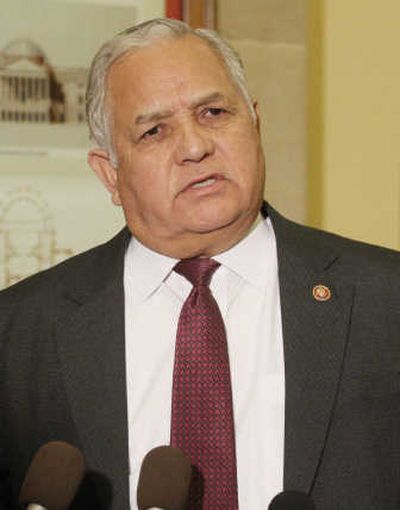Ex-CIA official ordered to testify

WASHINGTON – The House Intelligence Committee issued a subpoena Thursday for Jose Rodriguez, the former CIA official who directed that secret interrogation videotapes of two suspected terrorists be destroyed.
The panel ordered Rodriguez, the former head of the CIA’s National Clandestine Service, to appear for a hearing on Jan. 16. Committee Chairman Silvestre Reyes, D-Texas, said Rodriguez “would like to tell his story but his counsel has advised us that a subpoena would be necessary.”
The CIA cracked open its files to congressional investigators Thursday, inviting them to the agency’s Virginia headquarters to begin reviewing documents and records related to the videotapes.
House Intelligence Committee staff members want to know who authorized the tapes’ destruction; who in the CIA, Justice Department and White House knew about it and when, and why Congress was not fully informed. The committee, which had threatened to subpoena the records if they did not get access this week, also wants to know exactly what was shown on the tapes, which document the harsh interrogation of two al-Qaida suspects in 2002. The CIA destroyed the tapes in 2005.
“We learned we have a long way to go, that there are a number of people involved that we need to talk with,” said a committee official, who spoke on condition of anonymity because the investigation of the tapes’ destruction is ongoing. “Many in the executive branch will be called.” The committee is still drawing up its list of witnesses to call.
President Bush declined to address the controversy, saying at a White House news conference Thursday he was confident that administration and congressional investigations “will end up enabling us all to find out what exactly happened.” He repeated his assertion that his “first recollection” of being told about the tapes and their destruction was when CIA Director Michael Hayden briefed him on it earlier this month.
At the Justice Department, investigators were combing through CIA e-mails and other documents and planning to interview former agency officials. One official familiar with the investigation said the review so far indicates that Alberto Gonzales, who served as White House counsel and then attorney general, advised against destroying the videotapes as one of four senior Bush administration attorneys discussing how to handle them. The official spoke on condition of anonymity because of the ongoing investigation. Gonzales’ attorney, George Terwilliger, declined comment.
Another of the administration attorneys, John Bellinger, then a lawyer at the National Security Council, has told colleagues that administration lawyers came to a consensus that the tapes should not be destroyed, said a senior official familiar with Bellinger’s account of the 2003 White House discussion. Bellinger could not be reached for comment.
“The clear recommendation of Bellinger and the others was against destruction of the tapes,” the official said, speaking on condition of anonymity because of the sensitivity of the matter. “The recommendation in 2003 from the White House was that the tapes should not be destroyed.”
Exactly which White House officials and attorneys discussed the tapes’ destruction and when, with whom, and what they recommended is still a matter of dispute, and one that Reyes hopes his investigation will settle.
Reyes plans to open his investigation with testimony from Rodriguez and acting CIA general counsel John Rizzo on Jan. 16.
The CIA has consented to allow Rizzo to testify, although it has not committed to a date. Rodriguez is represented by attorney Robert Bennett, who also once represented President Clinton, two former secretaries of defense and New York Times reporter Judith Miller.